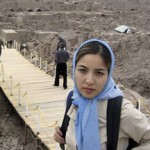Sunday
Apr192009
Roxana Saberi/Hossein Derakhshan Update: Ahmadinejad Intervenes in Court Cases
 Sunday, April 19, 2009 at 13:43
Sunday, April 19, 2009 at 13:43  UPDATE: Curiously, CNN does not seem to have noticed Ahmadinejad's intervention. Their current story focuses on the statement of Reza Saberi that his daughter is "frail and weak" in Evin prison.
UPDATE: Curiously, CNN does not seem to have noticed Ahmadinejad's intervention. Their current story focuses on the statement of Reza Saberi that his daughter is "frail and weak" in Evin prison. *********************
Enduring America, 18 April: "It could be that judicial forces wanted to show 'independence' from political pressure (ironic given that this is a politicised case) and moved quickly."
Iranian politics just swung in favour of Roxana Saberi.
Less than 24 hours after the announcement of Saberi's 8-year jail sentence on espionage charges, the office of Iranian President Mahmoud Ahmadinejad has published a letter to the judiciary about the cases of Saberi and jailed Iranian-Canadian blogger Hossein Derakhshan (whose case Enduring America highlighted last November):
Based on the president's insistence, please make sure that all the legal stages about the mentioned people be based on justice.......and you personally make sure that the accused people will enjoy all freedoms and legal rights to defend themselves and their rights will not be violated.
Translation: the Iranian prosecutors and courts pushed this case to a quick conclusion. Now, facing the consequences for US-Iranian engagement and also wanting to curb the judiciary's activisms, Iranian leaders are pushing back.
The showdown will come as the case is appealed. Ahmadinejad has clearly indicated that he wants --- quickly --- a reduction of Saberi's sentence. Such a move will meet the measured but clear response of Barack Obama and Hillary Clinton that they were "deeply disappointed" over yesterday's announcement.
However, the President's wish is not necessarily a command. Will the prosecutors and judges try to hold their line and enforce the full 8-year jail term?

 Iranian-American journalist Roxana Saberi
Iranian-American journalist Roxana Saberi  It is a rare day when I agree with
It is a rare day when I agree with